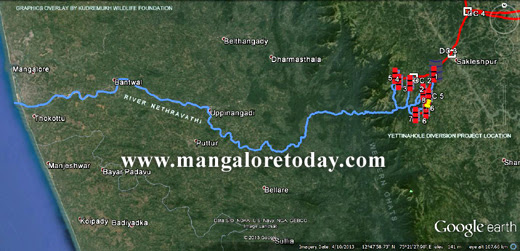Netravathi basin facing danger from unplanned development
Netravathi basin facing danger from unplanned development
Mangalore Today News Network
Mangaluru, Feb 24, 2018: According to a study report released by a team of researchers from the Indian Institute of Science (IISc), Bengaluru, here on Feb 23, Friday. Netravathi river basin in the State, is facing grave danger from ignorant development paths and is becoming a very serious thereat to the areas ecological balance.

The report titled “Carrying capacity of Netravathi river basin based on the ecological sensitiveness” was released by Energy and Wetlands Research Group (EWRG), Centre for Ecological Sciences (CES), IISc, at Alva’s College during the pre-lake 2018 conference jointly organised by the IISc and Alva’s Education Foundation.
It said that river diversions, hydro electric projects, coastal reservoirs, commercial plantations, unscientific tourism, etc., would cause irreplaceable loss of rich biodiversity in the river basin. Referring to the river basin, it said that Netravathi having a catchment area of 4,409 sq km covers 11 taluks in Chikkamagaluru, Hassan, Kodagu, Dakshina Kannada and Udupi districts. It originates in Bangrabalige valley, Yelaneeru Ghat of Kudremukh in Chikkamagaluru district. The basin is part of the ecologically fragile Western Ghats, one among the 35 global hotspots of biodiversity. “It is the lifeline of Dakshina Kannada region supporting the enormous population with rich resource base and diverse cultures,” it said.
The 203-page report from T.V. Ramachandra, co-ordinator, EWRG-CES, Bharath Setturu and Vinay S., researchers, said that rivers/streams in the ecologically sensitive regions should not be diverted or manipulated as that would affect the water retention capability of the catchment area and ground recharge potential. It would affect the sustenance of water in the streams and affect the downstream users’ right to adequate freshwater. The report said that of the 433 villages in the basin, 111 are in ecologically sensitive region (ESR) I followed by 69 villages in ESR II, 119 villages in ESR III and 134 villages under ESR IV. “Persistence of the endemic (rare, threatened, etc.,) species in ESR I and ESR II calls for serious attention from conservationists and decision-makers to initiate programmes immediately for conservation,” the report said. The report assumes significance in view of the ongoing Yettinahole diversion project in the Netravathi basin.
Earlier, a group of researchers from IISc, led by Ramachandra, had, in a report, questioned the State government’s estimation of the project yielding 24 tmcft of water for diversion to parched districts. The group said that only 0.85 tmcft of water could be diverted from the project. The group had warned that the project would lead to water scarcity in Hassan and Dakshina Kannada and would not benefit Chikkaballapur, Kolar and Tumakuru districts. There is a need for authorities to carefully asses this as the welfare of people is at stake.
- Sri Lankan navy arrests 11 Indian fishermen, seizes trawler
- Engineer, autorickshaw driver arrested for derogatory posts on actor Darshan’s wife
- Indore water contamination: Mayor confirms 10 deaths; over 270 hospitalised
- Karnataka survey reflects trust in voting machines, BJP targets Rahul Gandhi
- Ballari clash: Case filed against MLA Janardhana Reddy, 10 others
- Zohran Mamdani takes oath as New York’s first Muslim mayor
- New Year’s eve celebrations light up Bengaluru amid tight security and crowd control
- Zomato, Swiggy hike gig workers payout amid strike call on New Year’s eve
- 25-year-old raped by 2 men, thrown out of moving van on deserted road in Haryana
- Contaminated water kills 7 in Indore, 2 civic body officials suspended
- 148 flights cancelled in Delhi as fog disrupts New Year travel plans, over 150 others delayed
- Uttarakhand: Two loco trains collide in Vishnugad-Pipalkoti hydroelectric project tunnel, 60 injured
- Puttur cheating case: Pratibha Kulai seeks cancellation of accused’s bail; protest planned in Kalladka
- Mangaluru: App-based taxi drivers allege harassment, demand better facilities at Airport
- Mangaluru-born Ayan Mendon scales Mount Kenya at 11, draws global attention
- Mulki: Youths assault farmer for refusing extortion demand; case registered
- Byndoor: Two critically injured in auto–car collision on NH-66 near Uppunda
- Kapu: Motorcyclist killed as bike crashes into bridge
- Moodbidri: 13-year-old boy dies after being hit by speeding car
- Sullia: Man lured under pretext of car hire, assaulted and killed; Two arrested
- Puttur: Priest couple arrested for attempting to rob retired college principal’s home
- Vitla: Massive fire guts electronics shop, several nearby stores damaged
- Mangaluru: Unidentified man’s body found in Bengre Phalguni river
- Nitte University Chancellor, N. Vinaya Hegde Passes Away
- Kogilu Layout eviction: MLA Bharath Shetty demands SIT probe into illegal settlements
- Mangaluru Student Goes Missing; Ullal Police Register Case
- APD Foundation Joins WHO Civil Society Commission
- Daiva’s prediction comes true: Janardhan Reddy walks free from jail
- Skills and Competencies Take Center Stage at MSN Dialogue Series
- Court remands Maoist Lakshmi to six-day police custody
- Sandhya Shenoy honored with Society for Materials Chemistry Medal-2024
- White Cornus Apartment in Mangaluru
- City girl wins first place in state-level spell bee competition
- Alleged ‘Love Jihad’ Case in Mangaluru: Woman left home voluntarily, says police
- Girl fatally struck by reckless two-wheeler near Belman
- New residential complex for the judges inaugurated in Mangaluru
- Absconding accused nabbed after 8 years
- Truck with cylinders turns turtle in Beltangady
- Bhoota Kola artist dies of cardiac arrest
- Development of the country should be our goal: Ganesh Karnik
- CITY INFORMATION
- TRAVEL
- TOURIST INFORMATION
- HEALTH CARE
- MISCELLANEOUS


 Write Comment
Write Comment E-Mail
E-Mail Facebook
Facebook Twitter
Twitter  Print
Print 